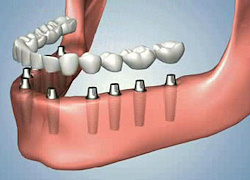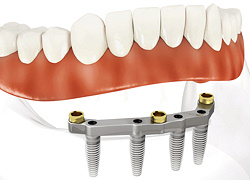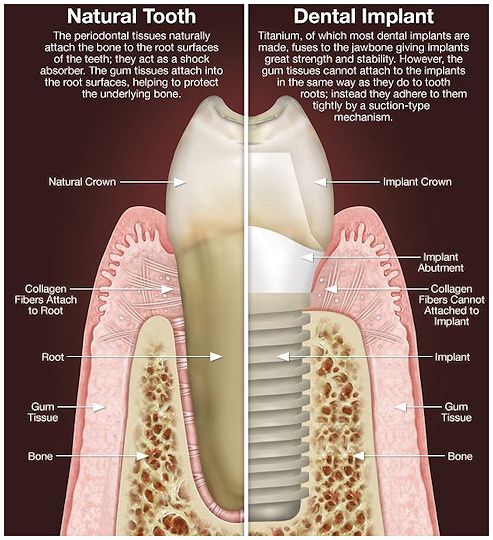Whole Mouth Dental Implants
Main page> Ask your dentist> Whole Mouth Dental Implants
Unhealthy teeth can significantly deteriorate to leave you with absolutely no teeth at all. Your teeth or the roots may even have rotted away causing the need for a multiple extraction. Dental implants are becoming an increasingly popular way of solving the problem of multiple missing teeth and you may even have your entire mouth fitted with them.
What Are They?
Dental implants are most commonly made from titanium and are inserted into the jawbone like an artificial root. A crown is then placed onto the implant to finish the look. The procedure is completed under local or general anaesthetic and is relatively straightforward but some preparatory surgery may be required if the bone is significantly deteriorated. If there is not enough bone to perform the procedure then you may have to look at other options. Those who have been assessed by a dentist and are found to be in good general health may then proceed with whole mouth dental implants. There are two types of restoration procedure when all the teeth are missing.
Fixed Full-Arch Bridge

There are normally two steps to having whole mouth dental implants placed. The implants are the part which is planted into the jaw bone to hold the false teeth in place. Several implants are placed along the jawbone strategically in order to hold the bridge firmly in place.
Generally, if all of the teeth are missing then a full set of implants can be placed. Any remaining teeth or parts of teeth may need to be extracted in order to make room for the full-arch bridge.

Implant Overdenture
This is the next best option to a fixed full-arch bridge. This fits over dental implants and is removable. The implants will keep the jawbone intact while the overdenture will give the appearance of having a full set of teeth.
A mould is taken of the gum and jaw to ensure that the denture will fit in the mouth without causing discomfort. Although it has the look of a plastic removable denture, it is much more stable and is supported by the dental implants.
Why You May Need Dental Implants
The most common cause of tooth loss is gum disease (for more information on gum disease and its symptoms, click here). Gum disease may advance forming a condition known as periodontitis. This can result in deterioration of the bone holding the teeth in place. The teeth may fall out by themselves or you may be advised that a full mouth extraction is necessary.
Decay can progress to infection which may also result in necessary multiple extractions. The infection can affect the gums leading to bone loss, much like gum disease.
Trauma, such as cracking a tooth beyond repair or damaging the root, can cause the tooth to fall out completely or it can cause the need for extraction.
There are some genetic conditions which can result in the complete absence of the adult teeth altogether. In this case, a dentist will ensure that there is definitely no chance that an adult tooth will grow in the affected areas and implants can be fitted.
Benefits of Dental Implants 
Dental implants have many advantages over other methods of teeth replacement. As they do not slip out like dentures do, they won’t cause embarrassment and are completely unnoticeable to you and others. They should not need replaced once they are fitted as long as they are taken care of well, and they also prevent the jaw from shrinking. This can occur over time due to missing teeth and cannot be rectified by dentures. Dentures may cause problems when eating or speaking but dental implants do not and are much more functional.
In addition, dental implants can significantly improve your self-esteem if you have suffered from a trauma or an infection. The cost of this procedure may be lower than you think and, for a full mouth of teeth, it may just be worth it in the long term. To book a free consultation about your new whole mouth dental implants, click here.




